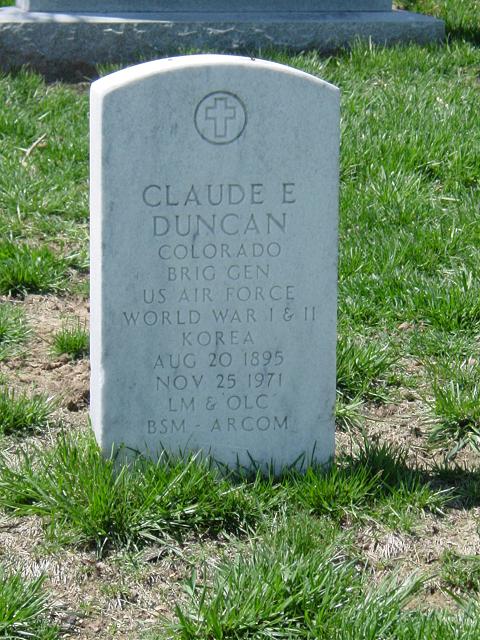Biography Courtesy of the United States Air Force
BRIGADIER GENERAL CLAUDE E. DUNCAN
Died December 1, 1971.
Claude Edward Duncan was born in Boulder, Colorado, in 1895. He graduated from high school at San Diego, California, in 1914, and then attended the University of California for one year.
In August 1917, he enlisted as a Private First Class in the Aviation Section of the Signal Reserve and entered the Aviation ground school at Austin, Texas. Upon graduation in November 1917, he was transferred to the American Expeditionary Forces in Europe, where he continued his pilot training and on March 13, 1918, graduated from flying school at Foggia, Italy, was rated a pilot and commissioned a First Lieutenant in the Air Reserve.
General Duncan continued to serve with the AEF after receiving his commission and later with the Army of Occupation in Germany until October 1919. The following month he was assigned to the First Aero Squadron at Mitchel Field, New York. In February 1920 he was transferred to Hawaii, where he served successively at Luke and Wheeler fields. He received his regular commission as a First Lieutenant in the Air Service July 1, 1920.
In December 1923, General Duncan became an instructor at the advanced flying school at Kelly Field, Texas, and in September 1927 assumed that position at the primary flying school at Brooks Field, Texas. He entered the Air Corps Technical School at Chanute Field, Illinois, in October 1929. He completed the maintenance and engineering course in April 1930 and was assigned to the Seventh Bomb Group at Rockwell Field, California. In October 1931 he joined the 17th Pursuit Group at March Field, Calif. In September 1935 he entered the Air Corps Tactical School at Maxwell Field, Alabama, graduated in June 1936 and assumed command of the First Bomb Squadron at Mitchel Field, New York. In December 1938, General Duncan was named assistant executive in the Office of the Chief of Air Corps.
General Duncan, in January 1942, was assigned as a special observer with the Eighth Air Force in England. The following month he became chief of staff of the Eighth Bomber Command there, and in June 1942, assumed command of the First Provisional Wing of that command. From August to November 1942 he was commander of the XII Bomber Command in England and North Africa.
In February 1943, General Duncan was assigned to the II Bomber Command at Spokane, Wash., and the following month went to North Africa on a special mission. He was assigned to the plans section of the Second Air Force at Colorado Springs, Colo., in May 1943, and two months later was named chief of the supply section of the 58th Bomb Wing at Marietta, Ga. From November 1943 to July 1944 he served successively as assistant executive and assistant chief of staff of the XX Bomber Command in India and China.
General Duncan assumed command of the air base at Pyote, Texas, in September 1944; and in January 1945 was named chief of staff of the Second Air Force at Colorado Springs, Colorado. He assumed command of the air base at Camp Pinedale, Calif., in April 1946, and the following September became commander of the air base at Long Beach, Califfornia.
In August 1950 General Duncan was appointed deputy for operations of the Fourth Air Force at Hamilton Air Force Base, California. The following October he became chief of staff of the Fourth Air Force and in December 1950 was named vice commander of that organization.
General Duncan has been awarded the Legion of Merit and Bronze Star Medal.
He is rated a command pilot, combat observer and technical observer.
Michael Robert Patterson was born in Arlington and is the son of a former officer of the US Army. So it was no wonder that sooner or later his interests drew him to American history and especially to American military history. Many of his articles can be found on renowned portals like the New York Times, Washingtonpost or Wikipedia.
Reviewed by: Michael Howard

